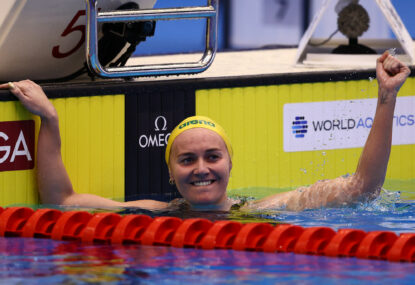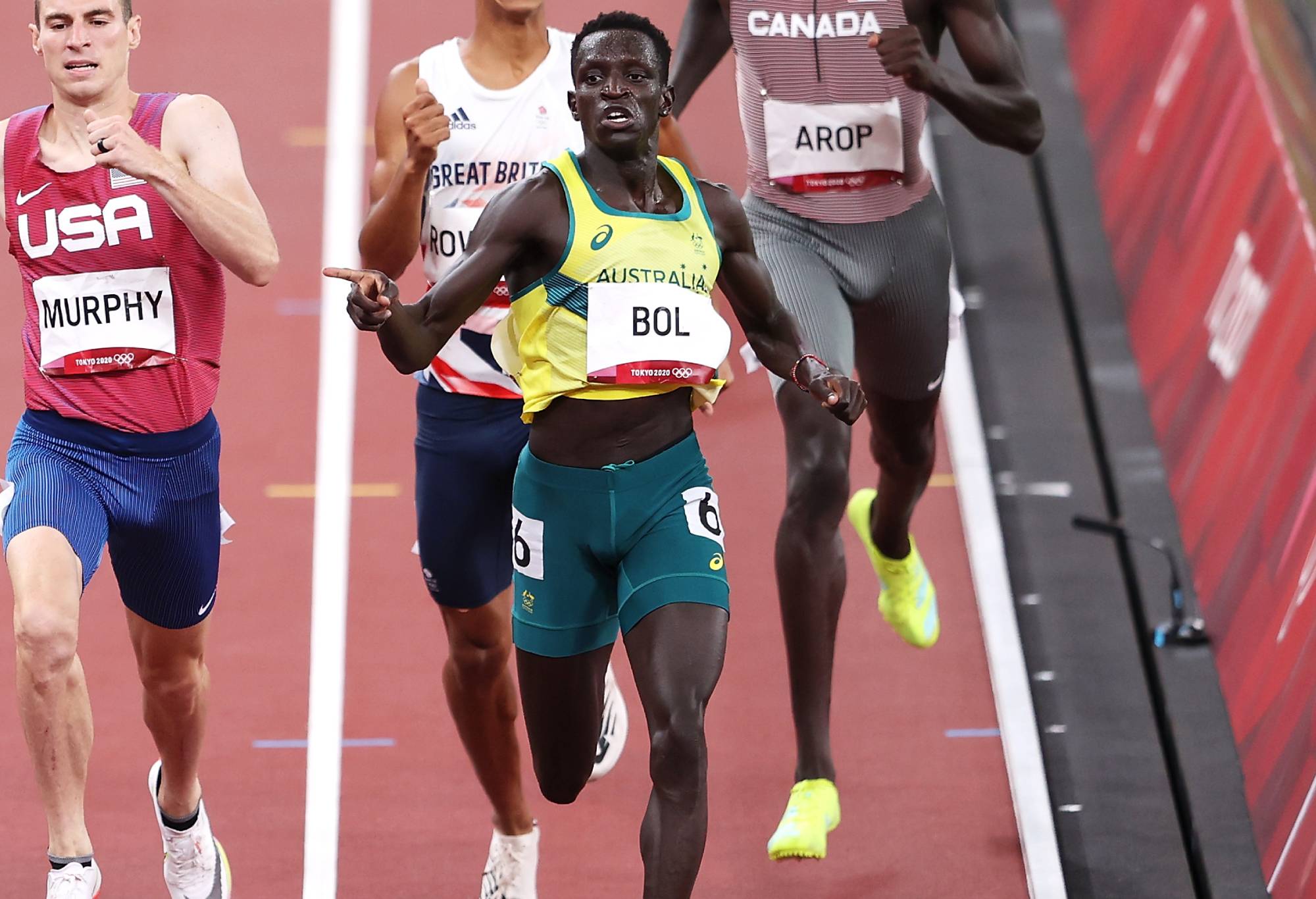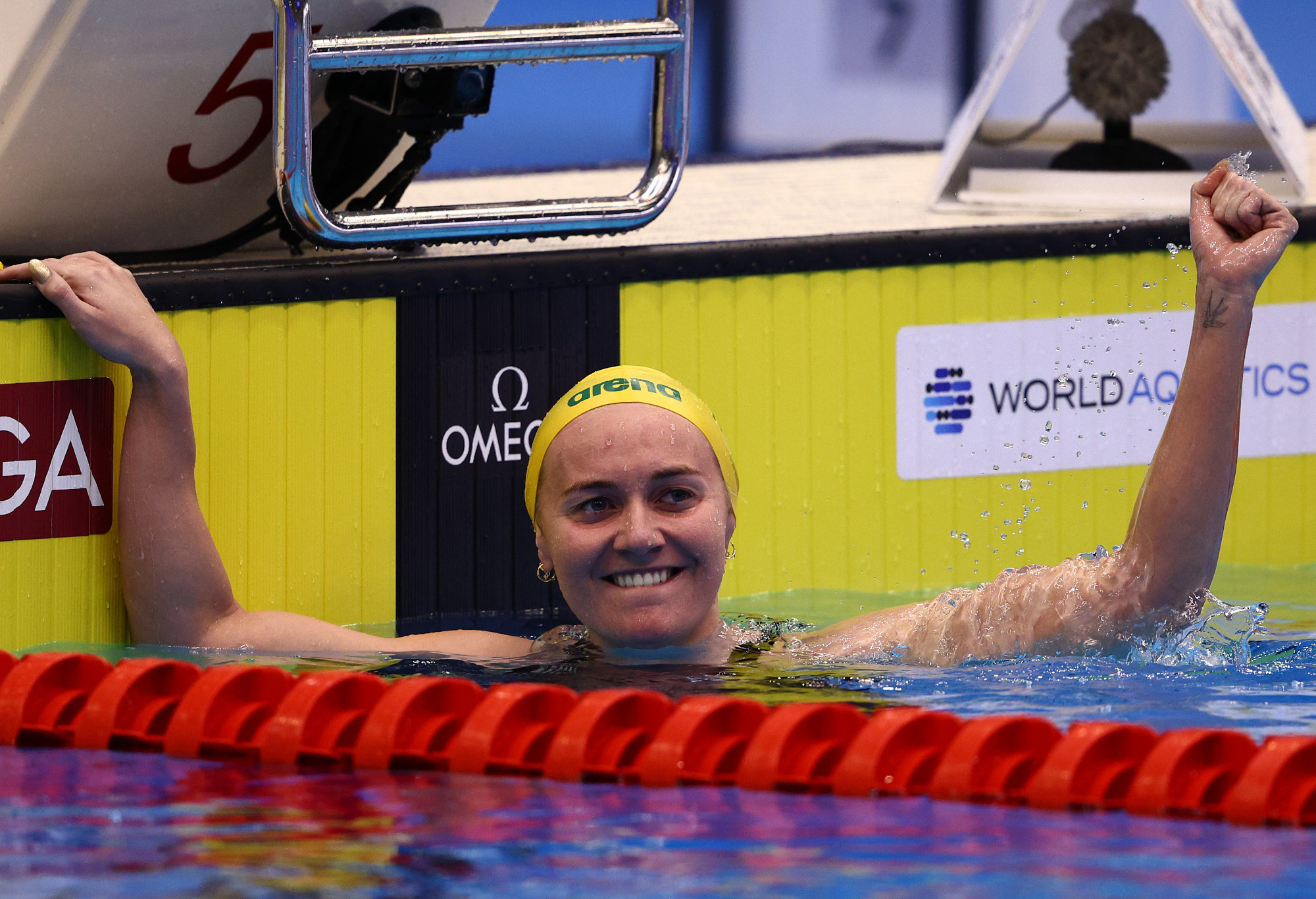'Someone will die': Olympic legend sounds harsh warning if Enhanced Games go ahead
Olympic swimming legend and Australian Sports Commission boss Kieren Perkins has warned that "someone will die" if a multi-sport event that allows athletes to…

I have always enjoyed watching running and swimming global championships as my two favourite racing sports covering sprint to long distances without the aid of any equipment.
As noted in 2018, “There’s something inherently human about sports like swimming and track. It is their simplicity which allows for the sports to become so highly anticipated during the Olympic Games”, a reality supported by the NBC network noting that both these sports (plus gymnastics) are the most popular sports.
From an Australian perspective, running and swimming have long provided many of Australia’s most famous Olympic Games (OG) moments.
I recall the 1976 OG, the only postwar games when Australia won zero gold medals, when many Australians looked to Stephen Holland (as the current world record holder) to win the 1500m freestyle, only for him to finish third behind two Americans (Bobby Hackett and Brian Goodell) when all three broke the world record.
This followed the enormous public expectation for Raelene Boyle, Australia’s three times OG sprint medallist (1968 and 1972) who was disqualified from the 200m event after false starting twice.
And with no Australian male winning an OG running gold medal since Ralph Doubell (800m 1968), there was immense public interest after Peter Bol won his 2021 OG 800m semi-final with an estimated 2.5 million Australians (one in ten) tuning in to watch the final with Bol finishing 4th.
On the track, memorable OG track moments for Australia include Herb Elliott’s 1960 1500m win at Rome in world record time, Betty Cuthbert being the only sprinter of any nation to win gold in the three distances (100m and 200m 1956 and 400m 1964), Cathy Freeman’s 400m victory before 112,000 home fans at the 2000 Sydney OG, and Sally Pearson’s 100m hurdles win at London 2012.

Peter Bol (Photo by Michael Steele/Getty Images)
In the pool, Australia has consistently produced multiple OG gold medal champions including Dawn Fraser (100m 1956-1964), Murray Rose (400m 1956 and 1500m 1956 and 1960), Michael Wenden (100m and 200m 1968), Shane Gould (200m and 400m 1972), Kieran Perkins (1500m 1992 and 1996), Grant Hackett (1500m 2000-2004), Ian Thorpe (400m 2000-2004 and 200m 2004), Emma McKeon (50m and 100m 2021), and Ariarne Titmus (200m and 400m 2021).
But, as we build towards the Paris 2024 OG, the prospects of Australia’s running and swimming teams are vastly different with its runners only having an outside chance to medal whereas our swimmers recently had one of their most successful world championships (WC) ever winning 25 medals (13 golds, 7 silver and 5 bronze).
In the male individual events, Cameron McEvoy won gold in the 50m freestyle, Kyle Chambers gold 100m freestyle, Samuel Short gold, silver and bronze 400m, 800m and 1500m freestyle; and Zac Stubblety-Cook silver 200m breaststroke.
Of the female individual events, Shayna Jack won silver 50m freestyle, Mollie O’Callaghan gold 100m and 200m freestyle, Ariarne Titmus gold and silver 400m and 800m freestyle, Kaylee McKeown gold in the 50m, 100m and 200m backstroke, and Elizabeth Dekkers silver 200m butterfly.
Australia’s incredible freestyle depth also saw its men, women and mixed gender teams win gold for all three 4x100m relays, as well as gold and bronze for the women’s and men’s 4x200m teams.
In terms of current runners, however, Australia has very few medal prospects at the upcoming world championships to be held in Hungary (19-27 August 2023), despite having many runners with top 20 times as of 13 August 2023: Catriona Bisset 6th 800m, Linden Hall 8th 1500m, Oliver Hoare 8th 1500m, Jessica Hull 9th 1500m, Joseph Deng 11th 800m, Abbey Caldwell 11th 800m, Peter Bol 16th 800m, and Stewart McSweyn 19th 1500m.
So why the immense difference in terms of our current fortunes between running and swimming?
A recent article, though also suggesting Australians may have a genetic disposition for swimming success (which I doubt), attributes Australia’s longstanding swimming success to its excellent training and coaching system from club to elite in terms of skill, conditioning and flexibility; and Australia’s geography and climate which enable year-round access to quality pools for training with familiarity to the sport aided by many Australians taking advantage of coastal waters from a young age which helps establish related skills and technique.
But running also shares some of the above characteristics that may explain Australia’s swimming success in terms of facilities, coaching, and climate.
Australian runners have pretty good training conditions virtually all-year round, have reasonable exposure to running from little athletics to school sports, have enough decent running tracks and parks to train on, and have good enough coaching expertise.
The simple reason why Australia’s runners cannot match the success rate of its swimmers is because running is a much harder sport to succeed in global terms.
Unlike swimming, a technical sport with complex technique and one which requires expensive facilities, running is a basic sport that anybody can do with many people around the world having some affinity and experience with the activity during their lifetimes.

Ariarne Titmus celebrates winning gold in the Women’s 400m Freestyle Final at the World Championships. (Photo by Clive Rose/Getty Images)
Yes, Australia should be proud of its swimming achievements, but swimming has long been dominated by rich countries and/or the authoritarian nations which seek to prove their prowess at the OG say the former Soviet Union and East Germany and more recently China).
To a large degree, resources matter for sports like swimming. In 2012, Goldman Sachs, citing per capita GDP income, found the greatest association between money and medals in cycling, followed by Judo, rowing, and swimming.
Apart from judo, cycling, rowing and swimming are sports where Australia has done very well at recent OG and WCs.
Scotland’s David Wilkie, an OG gold medallist breastroker in 1976, also noted the importance of resources for swimming and how the sport was hardly popular outside the OG year.
Having noted that financial support for swimming today was “quite incredible” and “night and day” different when compared to his amateur era, Wilkie argues that “Swimming is still a rich man’s sport,” with the focus of the sport simply for the elite and how many OG medals won at a time when “We (British) don’t have a great deal of interest in the sport”.
Although both running and swimming are sports that demand enormous dedication and talent to succeed, it is Australia’s runners who face much greater competition from other nationalities who do not need expensive facilities to train and who have much less cultural affinity with the sport of swimming.
One has only to recall Jamaica’s sprinting success from 2008 to 2012 with even the great Usain Bolt training on a basic grass track, and the reality that many Kenyans excel at the global level despite training on dirt tracks and roads.
For athletes from poorer nations, such as from Kenya, Ethiopia and even Jamaica, the reward from running success is also attractive to their many talented young athletes in nations with a longstanding cultural affinity with running going back many decades.
For example, whereas the minimum wage in Australia is $US15 per hour in a country with a pretty decent social welfare system, it is reported that even Ethiopia’s public sector workers earn just $US21 per month, Kenya’s lowest agricultural minimum wage for unskilled employees was $US52 a month, and that Jamaican workers can earn as little as $US90 per month.
For runners from poor nations, winning major marathon races ($US150,000 for Boston), a world championship gold ($US70,000), and a Diamond League race or final ($US10,000 and $US30,000), is a lot of money.
At the same time, fewer Australians are going to commit to running in a sport where they have much less chance of succeeding, and a sport where only a small proportion of runners (and swimmers) make more than $US100,000 per year and not much more than the average Australian yearly salary (around $US60,000).
With running and swimming only having a few superstars receiving multi-million dollar endorsements (including Usain Bolt, Michael Phelps, Katie Ledecky and Andre De Grasse), talented Australians living in a wealthy country may also be attracted to many other more expensive sports where they have a greater chance of being rewarded.
In addition to sports like golf and tennis, where many hundreds of people around the world can earn above $US100,000 income per year, Australians participate in many professional and semi-professional domestic and international leagues to make decent money including its four football codes, cricket, basketball and netball.
Of the OG racing sports, there are also many more Australian professional cyclists that earn much higher income than most of its runners and swimmers racing in Europe, as best represented by the success of Cadel Evans who won the 2011 Tour of France and was reported to be earning $A2.5 million as of 2015. As of 2023, some 15 Australian sportsman made $A4.7 to $A51 million in sports such as basketball, football (soccer and American football codes), golf, tennis, motor racing and baseball.
Quite simply, in terms of the small numbers of Australians that will seek to excel at professional running, winning a global running medal (especially gold) has proven extremely hard as the sport became more professional from 1983 with the introduction of regular world championships in non-OG years, notwithstanding considerable success in field events in recent years.
While our female runners have proven more successful with three multiple global champions (Jana Pittman 400m hurdles 2003 and 2007; Cathy Freeman 400m 1997, 1999 and 2000; and Sally Pearson (100m hurdles 2011, 2012 and 2017), Rob de Castella has been Australia’s only global champion (1983 marathon).
There are few nations that do well at both running and swimming. The US is the leader of both sports winning 38 of the 127 2023 swimming WC medals and 18 of the 81 running medals at the 2002 athletics WC.
Only Great Britain has also been quite successful in recent times at both running and swimming winning 8 swimming medals and 7 running medals for the in 2022.
For Australia and China, two nations that spend considerable resources trying to win global medals, and who finished second and third at the 2023 world swimming championships with 25 and 16 medals, they won zero running medals at the 2022 WC.
Nevertheless, there are signs that Australian runners will have a better chance to win global running medals in coming years.
Not ruling out the possibility that some Australians athletes may also choose to cheat with illegal performance enhancing drugs, World Athletics is adopting a tougher drug testing regime to address any country with a lax testing program, including Kenya and Ethiopia who have produced many running champions in recent decades.
In July 2021, prior to the Tokyo OG, 20 track and field athletes were banned from the Tokyo Olympics for not meeting the Athletic Integrity Unit’s strict anti-doping test rules which affected athletes from Belarus, Bahrain, Ethiopia, Kenya, Morocco, and Ukraine which were all regarded as “high-risk” because of the standard of their own domestic drug-testing programmes.
As it stands, all athletes from a Category A country must participate in a minimum of three no-notice out-of-competition tests, to take place no less than three weeks apart in the 10 months leading up to a major event, such as the Olympics.
To conclude, while Australian runners struggle to succeed in a highly competitive global sport, there is still considerable interest in the sport to encourage talented youngsters to persist with the sport.
While there are few of Australia’s runners with a realistic chance of winning a medal at the 2023 WC, particularly now that Oliver Hoare has scratched from the 1500m, new names like Cameron Myers have emerged to this season break the world under 18 1500m record with a fantastic time of 3:33.26 at the July Diamond League event in Silesia.
However, for reasons presented in this opinion piece, Australia should take immense pride in any top 8 position achieved by runners at the 2023 WC or next year’s OG, with any won medals (of any colour) a magnificent achievement and much harder to win that a global swimming medal.